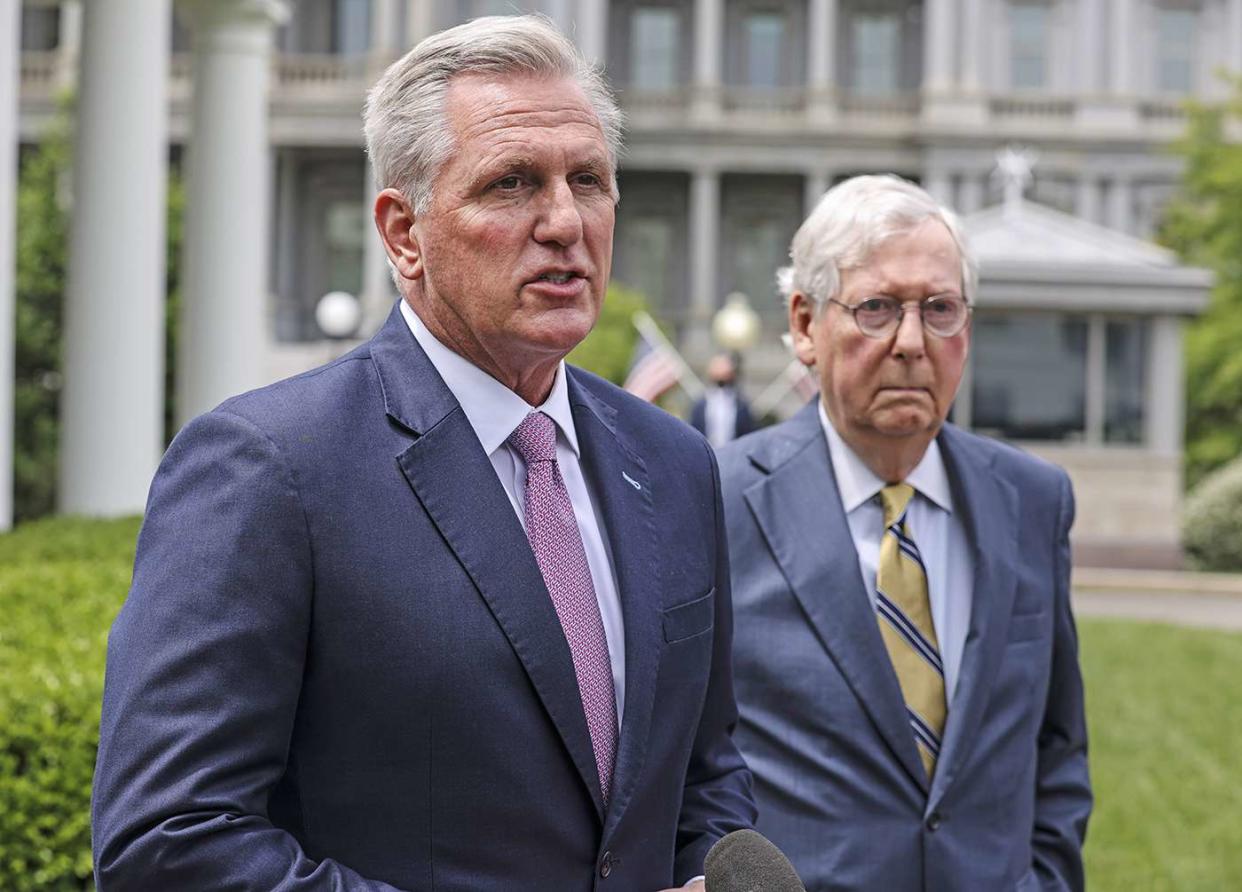Who Will Be the Next Speaker of the House? Republicans Weigh Options as GOP Majority Looks Likely

- Oops!Something went wrong.Please try again later.
- Oops!Something went wrong.Please try again later.
Oliver Contreras/Sipa/Bloomberg via Getty Rep. Kevin McCarthy, Sen. Mitch McConnell
As Republicans prepare for a likely takeover of the House of Representatives, members of the GOP are already battling over who to nominate for speaker.
House Republican Leader Kevin McCarthy, who was initially presumed to take over current Speaker Nancy Pelosi's position in January, now finds himself in a tougher-than-expected campaign for the gig that most top-ranking party officials are easily handed, as he once again risks coming up short of the necessary votes to secure the position.
Though McCarthy remains the likeliest candidate for speaker, some on the far-right reaches of his party — including members of the right-wing House Freedom Caucus — are stirring up division in hopes of earning a seat at the table. Others are frustrated by the GOP's lackluster performance in the midterms, pointing fingers at McCarthy's leadership for their losses.
RELATED: The Biggest Midterms Surprises, from Lauren Boebert's Neck-and-Neck Race to the Red Wave That Wasn't
In the coming days, Republicans will need to get on the same page soon in order to ensure a Republican becomes speaker, meaning McCarthy will need to find a way to win over critics' support or step back.
House Freedom Caucus vs. Kevin McCarthy

Win McNamee/Getty Images Kevin McCarthy
The drama unfolding within the Republican Party right now stems from one political faction's longstanding opposition to Rep. McCarthy — and that same group's relatively unsuccessful attempts at being taken seriously by House GOP leadership.
Widely viewed as a modern iteration of the now-dissolved Tea Party Caucus, the Freedom Caucus formed in 2015 as the furthest-right voting bloc in the House, aiming to steer House GOP leadership away from the center and becoming fierce defenders of President Donald Trump since his rise to political prominence.
The caucus, currently led by Pennsylvania Rep. Scott Perry and Ohio Rep. Jim Jordan, is invite-only and purposefully secretive, with the official member list kept private from American voters. An alleged rule within the party is that if at least 80% of members are in agreement on a House issue, all in disagreement are bound to vote with the majority.
In October 2015, the Freedom Caucus was credited with forcing Republican House Speaker John Boehner's resignation from both the speakership and the House, after complaining about some of his moderate actions and claiming they'd been punished for opposing his nomination at the start of the term. In the frantic search for a replacement, Rep. McCarthy raised his hand and seemed likely to get the job, before still-dissatisfied Freedom Caucusers objected and McCarthy withdrew from the running.
Former vice presidential candidate Paul Ryan was ultimately elected speaker that year, seen as someone who could unify the fractured Republican Party. This time around, McCarthy will need to quickly appease the same opposition group before meeting a similar fate as before.
How McCarthy Can Win Freedom Caucus Support
As it stands, McCarthy appears easily able to win his party's nomination for the January House speaker election. But if Republicans push him forward, they risk a number of right-wing House representatives defecting for their own candidate on election day and splitting the party's vote.
Since Republicans are only poised to control the House by a razor-thin margin if they take the majority, they will need every single member of the party to align their votes in order to keep the Democratic nominee from sneaking into power. That means they need to either find a more unifying Republican to nominate, like they did with Ryan in 2015, or McCarthy needs to concede to the demands of the Freedom Caucus in order to earn their support.
Those demands include, in part, taking a bold stance on holding impeachment hearings for top Democratic officials like President Joe Biden and Homeland Security Secretary Alejandro Mayorkas, and adopting rules that make it easier to oust a House speaker at any time if the party is dissatisfied with their performance. Whatever critics can leverage out of their defiance, they will.
.@chiproytx to: @glennbeck: "Kevin McCarthy does not have the 218 votes to gain the speakership. So, the question is going to become are we going to rally with someone else or is Kevin going to demonstrate that the's got a vision and a plan to carry this country forward?"
— Mica Soellner (@MicaSoellnerDC) November 11, 2022
The good news for McCarthy is that he has key allies vouching for him. Former President Donald Trump endorsed him for speaker this week, and Freedom Caucus Vice Chair Jim Jordan told Fox News Radio that he doesn't anticipate anyone actually trying to challenge McCarthy.
"The guy who gets you to the Super Bowl, even if it's a game in overtime, gets to coach the game in my judgment," Jordan said, adding, "I've not heard of anyone stepping forward." Thus, barring a sudden and major uprising, McCarthy has a good chance of succeeding Pelosi to become the third-highest-ranked government official next month.
What's Happening with House Democrats

Tom Williams/CQ-Roll Call, Inc via Getty Democratic Reps. Nancy Pelosi and Steny Hoyer
Leadership of the House Democratic Caucus will also be decided soon, but the left-leaning party has stayed relatively quiet about what discussions are looking like behind the scenes. That's partly because Democrats are holding out hope for an upset that allows them to keep control of the House, and partly because Speaker Pelosi has not publicly made a decision on what position, if any, she would like to hold next year.
Traditionally, as the leader of her party's caucus, Pelosi would either continue her role as House speaker if Democrats keep the majority, or be elected House minority leader if Republicans take control. This year is different, for a few reasons.
When Pelosi, now 82, began her second stint as House speaker in 2018, she said she'd only serve four years in the role — a statement to help get unsupportive Democrats in her corner. As 2022 neared, however, and she had carried her party through two successful impeachment votes, an insurrection and monumental legislative feats, many expected her to renege on that promise and continue her hot streak if Democrats could defend their House majority.
Never miss a story — sign up for PEOPLE's free daily newsletter to stay up-to-date on the best of what PEOPLE has to offer.
Then, in October, Pelosi's 82-year-old husband, Paul, suffered a violent, life-threatening hammer attack in the couple's San Francisco home, allegedly at the hands of a right-wing conspiracy theorist who broke in with the goal of kidnapping and harming the speaker. (The attacker has since pleaded not guilty to several felony charges against him, though police claim he admitted to the crimes in detail during a recorded interview.)
Amid Paul's recovery, Speaker Pelosi told CNN's Anderson Cooper that the attack may affect her decision to retire.
RELATED: Nancy Pelosi Details Heartbreaking Moment She Found Out Her Husband Paul Had Been Attacked
If Pelosi does not vie for the top Democratic House position, whether that ends up being speaker or minority leader, there are a handful of people rumored to be eyeing her spot.
The post could, in theory, go to the next-highest-ranked Democratic leaders — Majority Leader Steny Hoyer, 83, or House Majority Whip Jim Clyburn, 82 — though their age and already-successful leadership careers have many thinking they'll sit the election out.
That leaves New York Rep. Hakeem Jeffries, the current House Democrat chair; Massachusetts Rep. Katherine Clark, the assistant House speaker whom Pelosi has reportedly been priming to seek a higher position; and Rep. Adam Schiff, chair of the House Intelligence Committee who allegedly began making his speaker aspirations known earlier this year.
Asked on Saturday if Pelosi has come to a decision about her political future that could set the Democratic Party's leadership plans into motion, spokesperson Drew Hammill tells PEOPLE, "The Speaker will make an announcement when she makes an announcement. Until then, let's all enjoy watching Kevin McCarthy lose a speakership his party hasn't even won in the first place."

